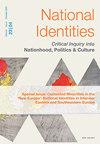Constructing national identity in the public space. The discursive transformations of the semiotic-linguistic landscapes of Pristina, Kosovo
IF 0.7
Q3 POLITICAL SCIENCE
引用次数: 2
Abstract
ABSTRACT This paper focuses on the discursive transformations of the semiotic-linguistic landscapes of Pristina, the capital of Kosovo as brought about by successive sociopolitical transformations and against the reversed power relations of the Albanians and Serbs. The study departs from the underlying assumption that the ethnic Albanian image the cityscape emits today does not coincide with the vision of civic inclusion and multi-ethnicity painted in the Constitution (2008) after the Declaration of Independence (2008). By means of a diachronic examination of successive alterations made to iconic landmark establishments at different political phases in time, it is posited that an appreciation of the contemporary discursive landscape requires an understanding of its dialogic relationship with the past. It is contended that semiotic changes reacted to the past by demarcating barriers that limit access to the previously dominant ethnic other. With reference to the ethnically segregated context of the 1990s in Pristina, attention is brought to the transgressive and invisible dimensions of the landscape for the construction of the city’s identity today.在公共空间建构国家认同。科索沃普里什蒂纳符号学语言景观的话语转换
摘要本文着重探讨了科索沃首都普里什蒂纳的符号语言景观在连续的社会政治变革和阿尔巴尼亚人和塞尔维亚人颠倒的权力关系中所带来的话语变革。这项研究偏离了这样一个基本假设,即今天城市景观中的阿尔巴尼亚族形象与《独立宣言》(2008年)后《宪法》(2008)中描绘的公民包容和多种族愿景不一致。通过对不同政治阶段标志性地标建筑的连续变化进行历时性考察,我们认为,要欣赏当代话语景观,就需要理解其与过去的对话关系。有人认为,符号学的变化是对过去的反应,划定了限制与以前占主导地位的其他种族接触的障碍。关于20世纪90年代普里什蒂纳种族隔离的背景,人们注意到,为了构建今天的城市身份,景观的越轨和无形维度。
本文章由计算机程序翻译,如有差异,请以英文原文为准。
求助全文
约1分钟内获得全文
求助全文
来源期刊

NATIONAL IDENTITIES
POLITICAL SCIENCE-
CiteScore
1.70
自引率
0.00%
发文量
37
期刊介绍:
National Identities explores the formation and expression of national identity from antiquity to the present day. It examines the role in forging identity of cultural (language, architecture, music, gender, religion, the media, sport, encounters with "the other" etc.) and political (state forms, wars, boundaries) factors, by examining how these have been shaped and changed over time. The historical significance of "nation"in political and cultural terms is considered in relationship to other important and in some cases countervailing forms of identity such as religion, region, tribe or class. The focus is on identity, rather than on contingent political forms that may express it. The journal is not prescriptive or proscriptive in its approach.
 求助内容:
求助内容: 应助结果提醒方式:
应助结果提醒方式:


